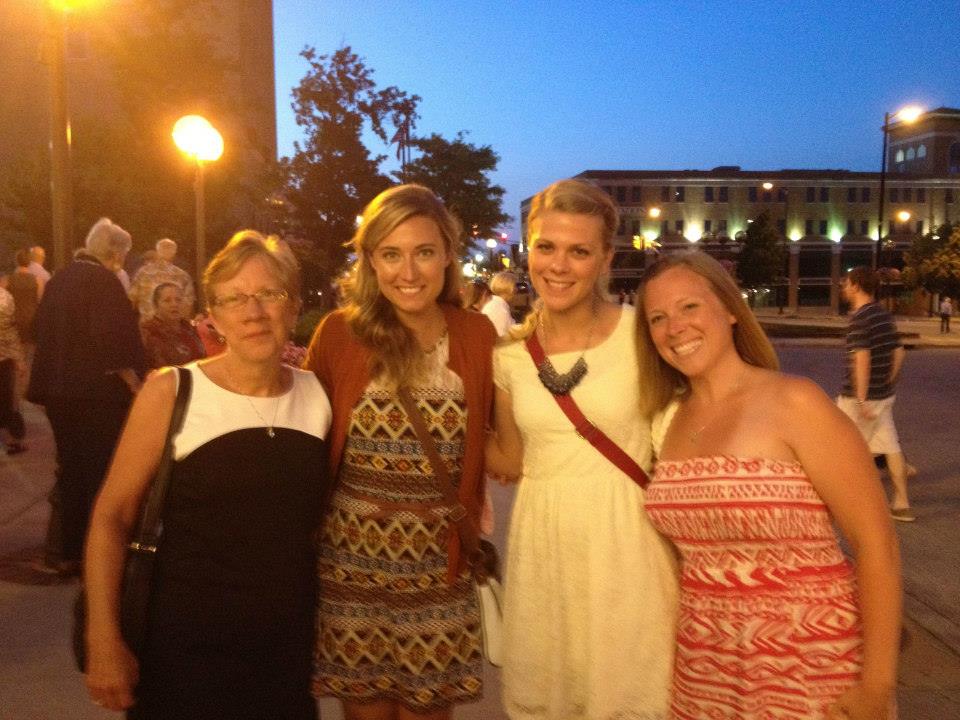Sometimes, when I don’t know how to start, I just begin with something obvious. It’s a good jumping off point. Today I’ll start with this thought.
We all have parents.
Whether they excelled at being a mom and dad, I can’t tell you. But it doesn’t change the fact that we all come from somewhere. A question I’ve been examining lately is what it means to honor your parents once you are all grown up {and maybe even a parent yourself.}
As many of you know, the idea of honoring your mom and dad comes from the Bible. We see it in the 10 Commandments. This notion ranks in the top ten of rules most important to God. And not only is it in the top ten, it makes the top five. Not only the top five, but it’s the first of the commandments to be accompanied by a promise if it’s kept. Exodus 20:12 says:
Honor your father and your mother, so that you may live long in the land the Lord your God is giving you.
So that you may live long…this commandment comes with a promise of longevity. A bit later, it comes with a promise of death if it’s broken. The very next chapter in Exodus {21:17} tells us:
Anyone who curses their father and mother is to be put to death.
Obviously, God cherishes parents. I won’t stay long on the topic of why longevity, but I think it’s worth touching. If children are raised according to God’s household plan, they grow up respecting their parents {honoring them, obeying them}. This leads to young adults who understand the beauty and importance of submission, not only to their parents, but to authority and ultimately, to God. People who practice self discipline and respect those in authority generally live safer, healthier, un-jailed, longer, lives. I’m not saying there aren’t any unusual circumstances. We live in a broken world, a world where the household isn’t always carried out how God intended, in a world where authority isn’t always 100% sound. But this was the plan. And children who grow up learning the value of self control, tend to grow up to avoid silly, physical risks.
It’s easy to look at the command and think you’ve done your part because you are all grown up now and when you were a child you {kind of} always did what they asked of you. But it’s not that easy. This isn’t only a commandment to children. There is no age limit on honoring your parents. So how do we carry this out when we live states away, own our own home, or are just off at college?
Luckily, the Bible gives a clear picture of what adult parent-honoring looks like.
First of all, the Hebrew translation of the word “honor” from Exodus 20 has a few layers of meaning. One is to obey/respect. Another is to “make honorable.” This means when we speak of our parents as adults it should put them in a good light. Even thought it’s very easy to vent frustration out to siblings or friends, we are to speak favorably of them. Further, we should put them in good light in front of others. Let’s look to Joseph for an example of this.
You can read the whole story here. For our purposes, let’s skip ahead. Joe was sold into Egypt and had since been promoted to Pharaoh’s go-to-guy. When he and his father were reunited he:
…brought his father Jacob in and presented him before Pharaoh. –Genesis 47:7
He took his dad to the ruler of the world’s mega power and presented him as a man the Pharaoh should know and respect.
Secondly, as adults we should continue to show our parents respect by addressing them respectfully and doing what they ask of us, even though we don’t “have to” any more. For this one let’s look at Jesus, right before he turns water to wine. See the whole story here.
Okay. Here is my major paraphrase. Really you should read the Biblical version. But this is the general idea. Jesus and His disciples are at a wedding and the wine runs out. Jesus’ mom is there and asks Him to perform a miracle to make more. John 2:4-5 says:
‘Dear woman, why do you involve me?’ Jesus replied. ‘My time has not yet come.’
His mother said to the servants, ‘Do whatever he tells you.’
A couple things here.
- 1. “Dear woman” is a term of respect. He’s not looking down on her or belittling her, instead He is demonstrating respect for His mom.
- He does it! He doesn’t need to. As He makes very clear: He takes His orders from His Father in heaven. But Mary is confident that He can make the miracle happen. And He does.
The last big Biblical example of honoring your mom and dad as an adult comes, again from Jesus. {But it’s found all over Scripture.}
The third way I see Scripture showing us how to honor our father and mother in adulthood is by caring for their needs. Look at Mark 7. Here we have the Pharisees giving Jesus and His disciples grief because they ate without going through the ceremonious rigamarole that was the standard for “hand washing.” It was an ordeal that had little to do with cleanliness and everything to do with vanity and outward appearances. In Mark 7:8-13 Jesus turns to them and says:
And he continued, “You have a fine way of setting aside the commands of God in order to observe your own traditions! For Moses said, ‘Honor your father and mother,’ and, ‘Anyone who curses their father or mother is to be put to death.’
But you say that if anyone declares that what might have been used to help their father or mother is Corban (that is, devoted to God)— then you no longer let them do anything for their father or mother. Thus you nullify the word of God by your tradition that you have handed down. And you do many things like that.
Do you know what Corban means? I didn’t either, until I started really studying this. It’s a buzzword for another one of the Pharisees’ traditions. Corban was an “out.” Let’s say you had elderly, poverty-stricken parents. They are sick and cannot live on their own. They don’t have money or the ability to care for themselves. In Jesus’ day, you could just say, “Corban!” That would end the discussion. It implies that all you have you are giving to the temple. Any help you could have given them, you plan to give away.
Now, whether people actually did give it to the temple was up for debate. Mostly it seems they liked to throw around the word corban to make themselves seem high and mighty. Like perfect givers. They didn’t want to help their parents. They wanted to be able to give big showy gifts to the temple…so they’d look good in front of their peers. It was done in vanity, and we were created by a God who examines the heart. The Bible shows us that faithful tithing is a healthy habit. But we are commanded to honor our parents. That trumps any tradition or vain practice.
He could have used a different instance to demonstrate the Pharisees use of tradition to buck God’s law, but He chose this one. Which makes me think, taking care of parents physically and lovingly is near and dear to our Lord’s heart.
Okay, one more look at this. Then I’m done. Promise. John 19:26 records an intimate moment shortly before Jesus was crucified. He knows He will be leaving the Earth, He knows He doesn’t have much time. So one of Jesus’ final acts is to make sure He is not calling “Corban.” He ensures that His mother is cared for.
When Jesus saw His mother there, and the disciple whom He loved standing nearby, He said to His mother, “Dear woman, here is your son,” and to the disciple, “Here is your mother.” From that time on the disciple took her into his home.
I’d love to hear your thoughts. Would you add any more references? How do you find honoring your parents is different as an adult than a child? Is it harder or easier?
Amy






